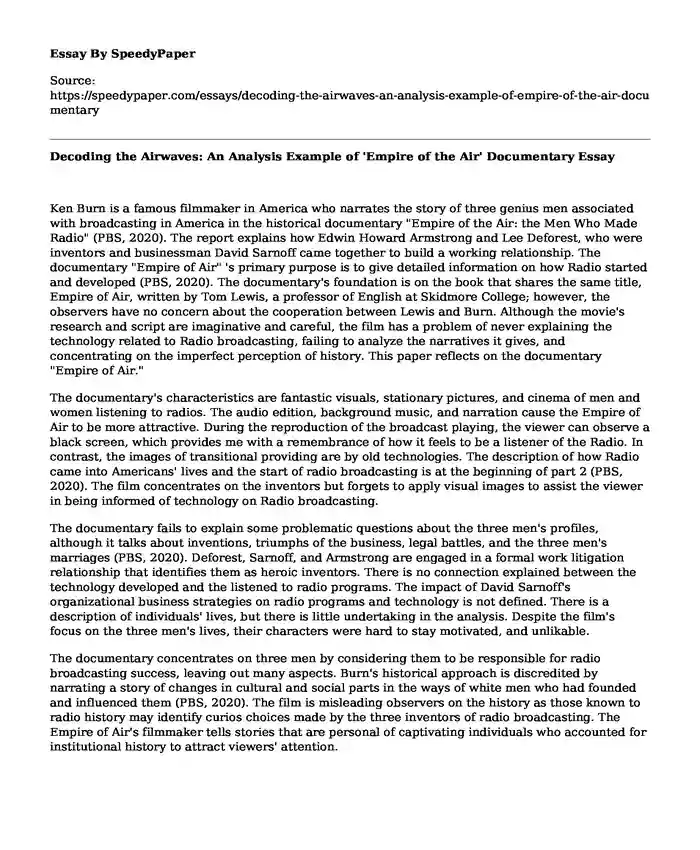Ken Burn is a famous filmmaker in America who narrates the story of three genius men associated with broadcasting in America in the historical documentary "Empire of the Air: the Men Who Made Radio" (PBS, 2020). The report explains how Edwin Howard Armstrong and Lee Deforest, who were inventors and businessman David Sarnoff came together to build a working relationship. The documentary "Empire of Air" 's primary purpose is to give detailed information on how Radio started and developed (PBS, 2020). The documentary's foundation is on the book that shares the same title, Empire of Air, written by Tom Lewis, a professor of English at Skidmore College; however, the observers have no concern about the cooperation between Lewis and Burn. Although the movie's research and script are imaginative and careful, the film has a problem of never explaining the technology related to Radio broadcasting, failing to analyze the narratives it gives, and concentrating on the imperfect perception of history. This paper reflects on the documentary "Empire of Air."
The documentary's characteristics are fantastic visuals, stationary pictures, and cinema of men and women listening to radios. The audio edition, background music, and narration cause the Empire of Air to be more attractive. During the reproduction of the broadcast playing, the viewer can observe a black screen, which provides me with a remembrance of how it feels to be a listener of the Radio. In contrast, the images of transitional providing are by old technologies. The description of how Radio came into Americans' lives and the start of radio broadcasting is at the beginning of part 2 (PBS, 2020). The film concentrates on the inventors but forgets to apply visual images to assist the viewer in being informed of technology on Radio broadcasting.
The documentary fails to explain some problematic questions about the three men's profiles, although it talks about inventions, triumphs of the business, legal battles, and the three men's marriages (PBS, 2020). Deforest, Sarnoff, and Armstrong are engaged in a formal work litigation relationship that identifies them as heroic inventors. There is no connection explained between the technology developed and the listened to radio programs. The impact of David Sarnoff's organizational business strategies on radio programs and technology is not defined. There is a description of individuals' lives, but there is little undertaking in the analysis. Despite the film's focus on the three men's lives, their characters were hard to stay motivated, and unlikable.
The documentary concentrates on three men by considering them to be responsible for radio broadcasting success, leaving out many aspects. Burn's historical approach is discredited by narrating a story of changes in cultural and social parts in the ways of white men who had founded and influenced them (PBS, 2020). The film is misleading observers on the history as those known to radio history may identify curios choices made by the three inventors of radio broadcasting. The Empire of Air's filmmaker tells stories that are personal of captivating individuals who accounted for institutional history to attract viewers' attention.
Conclusion
In summary, the Empire of Air is a documentary by Kevin Burn that explains two inventors; Edwin Howard Armstrong and Lee Deforest, and businessman David Sarnoff's roles in inventing new radio broadcasting technologies. The film is rich in beautiful visuals, still images, and movies of people. The personal lives of three men involved in the invention of radio broadcasting are also described in the film, as shown above.
Reference
PBS (2020). Empire of the Air: The Men Who Made. Ken Burns. https://www.pbs.org/video/empire-of-the-air-the-men-who-made-radio-hurpid/Radio
Cite this page
Decoding the Airwaves: An Analysis Example of 'Empire of the Air' Documentary. (2024, Jan 05). Retrieved from https://speedypaper.com/essays/decoding-the-airwaves-an-analysis-example-of-empire-of-the-air-documentary
Request Removal
If you are the original author of this essay and no longer wish to have it published on the SpeedyPaper website, please click below to request its removal:
- Free Essay: Business Plan Sample
- Free Essay Sample on Public Relations and the New Media
- Free Essay Sample with a Literature Review on Educational Games
- Soundtrack Analysis of a Scene in the Film Matrix (1999). Essay Sample
- Free Essay Example on Marketing and Communication Plan
- The MasterCard Brand - Paper Example
- Win Customers Through Information Technologies - Free Paper Sample
Popular categories





